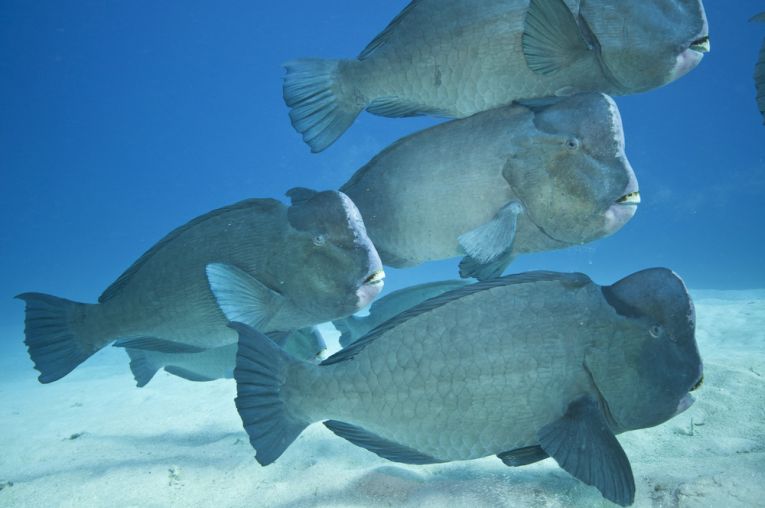In order to understand how algae can take over from coral on reefs, we have to see how the human influence on global and local scales functions. The global scale covers, basically, carbon emissions and ocean acidification.
Locally, the fishing industry has to take responsibility for reducing the herbivorous fish populations to a ludicrous low. This has been done partly by failing to fish for predator species, but almost universally, people overfish the herbivores. Water quality and disease are both minor factors in the most common reef degradations.
At 1.3m and 46kg, the largest of the browsers is the green humphead parrotfish, Bolbometopon muricatum. The paper classes him as a scraper/excavator! One of the worries is the effect of territorial damselfish. They are little-fished, so assume a large profile in fished communities. Unfortunately, unlike the useful grazer herbivores such as Kyphosids and Siganids (eg. the drummers or sea-chubs), they farm algae and thereby provide a dangerous increase in their "turf."
This paper by CB Edwards and nine colleagues from the Scripps Institute of Oceanography at UC, San Diego, Oceanlink, the National Geographic Society, NOAA, the University of Hawaii, the Australian Institute of Marine Sciences and the Nature Conservancy in Australia appears today. They present their paper in the Proceedings of the Royal Society B.
The research takes on board the loss of biomass, large species and certain functional groups because of herbivore fisheries and counts out the abundance, biomass of herbivores and the composition of their community. One finding that is herbivorous fish populations might have to be managed so that they are much larger than normal, just to get rid of the algae on degraded reefs. Even the lovely if inelegant parrot fish has its place in the ecosystem as a recycler.
The populations of this large coral-cruncher are often composed of quite small groups, while over-fishing has reduced their effects to a great extent. Unfished reefs still occur on distant islands, but the problems of overfishing on reefs are so very great. The authors recommend management of biomass and the composition of key groups of fish such as herbivores. The unfished islands of the Pacific provide a template at the moment for how ecosystems should work.










